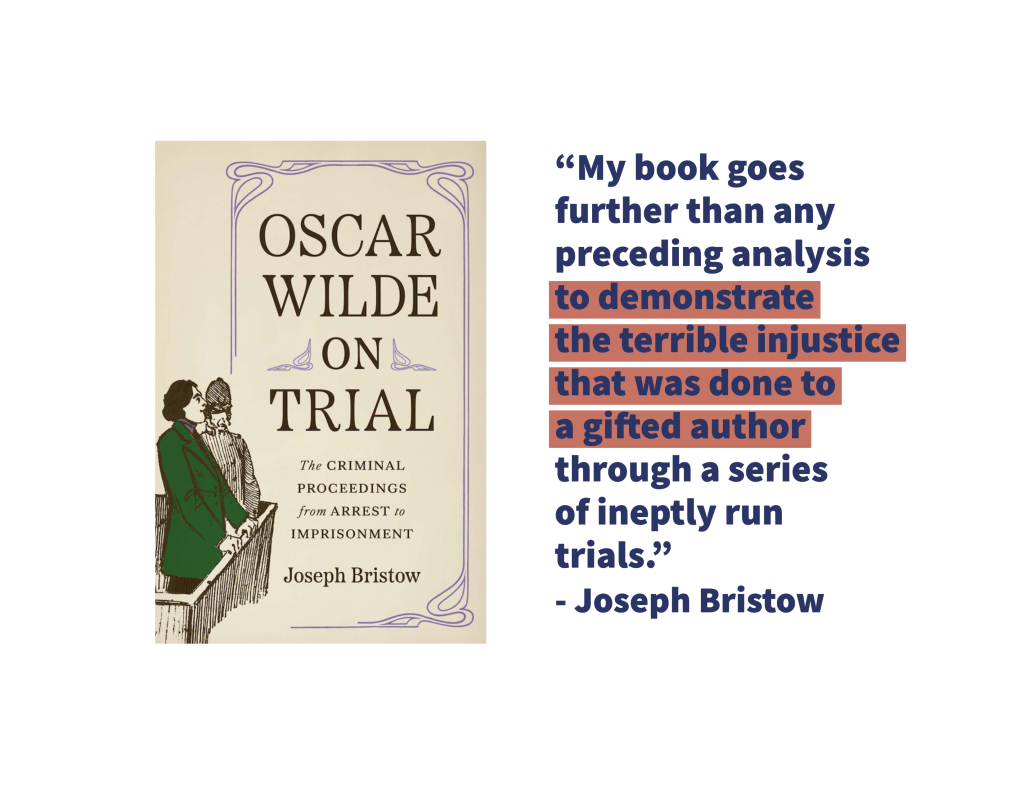What We’re Reading with Joseph Bristow

Professor Joseph Bristow’s new book, Oscar Wilde on Trial: The Criminal Proceedings, from Arrest to Imprisonment, is available now through Yale University Press. We caught up with Professor Bristow to discuss how his new work came about.
Can you tell us a little bit about your book, what it focuses on?
Oscar Wilde on Trial undertakes a detailed reappraisal of the legendary sexual scandal that destroyed the professional and personal career of one the greatest writers of the time. Unlike several earlier studies, which provide little in the way of information about the press sources that reported extensively on Wilde’s trials, my book reconstructs the proceedings from a broad range of newspapers that shed light on the extent of queer blackmail and male prostitution in 1890s London. Where previous commentators such as H. Montgomery Hyde felt obliged to comment on “Wilde’s peculiar, inverted instincts,” I draw attention to the unapologetic boldness with which Wilde pursued his sexual contacts with other men. Moreover, Oscar Wilde on Trial contests Hyde’s belief that Wilde’s “mode of life dragged him down to the depths of a pathological case.” At no point did Wilde ever admit that he had done anything wrong. My book goes further than any preceding analysis to demonstrate the terrible injustice that was done to a gifted author through a series of ineptly run trials. The moment has come for the Crown to grant Wilde a prerogative of mercy, in keeping with the belated clemency shown to Alan Turing, who in the early 1950s suffered prosecution under the same law that sent Wilde to jail for two years.
How did you become interested in writing about Oscar Wilde and the trials he faced?
I was asked to give a plenary talk at a British conference in 2013, and I chose to work on the trials, since I realized that—even though I’d established myself as a prominent scholar of Wilde’s works—I knew comparatively little about the trials. Once I started reading many different (and recently digitized) newspapers, I realized that the extant sources on the trials were deficient.

What was the process like doing research for your book?
Much of my research draws on the Oscar Wilde collections held at UCLA’s William Andrews Clark Memorial Library. These are the largest archives of their kind anywhere in the world. I also made use of the Wilde-related materials held in the Eccles Bequest at the British Library. On Wilde’s imprisonment, I made extensive use of the official Crown documents held at the National Archives, Kew, near London.
What do you hope readers come away with after reading this work?
I’d like readers to appreciate that Wilde was not by any means tried fairly during the Crown’s criminal prosecution. He was sentenced to two years in jail (in solitary confinement with hard labor)—the maximum sentence under the Criminal Law Amendment Act 1885—for committing vaguely defined acts of “gross indecency” with other males. He was convicted on the basis of evidence given mainly by suborned and carefully groomed male witnesses whose traded in blackmail and prostitution. As Wilde’s defense counsel made clear, much of the evidence was contaminated because it was given by individuals who freely admitted to having committed what were criminal sexual acts with Wilde—and these men did so with impunity. (None of the witnesses were charged.)
Do you have any upcoming projects on the horizon that you’d like to share or talk a bit about?
Currently, I’m finishing up (with my coeditors Rebecca N. Mitchell and Yvonne Ivory) an edition of Oscar Wilde’s unpublished, unfinished, and miscellaneous works for Oxford University Press. I am also working with a UCLA graduate student, Sophie Rickless, on an edition of Oscar Wilde’s 25,000-word “Philosophy” notebook, which is held at the Clark Library. This remarkable document contains Wilde’s notes for his Final Examinations in Literae Humaniores (also known as “Greats”) at Oxford, which he took in 1878. His notes engage with many different works, including Plato’s Republic, Aristotle’s Nicomachean Ethics, Francis Bacon’s Novum Organum, and John Stuart Mill’s System of Logic. And I’m developing plans for a monograph on queer blackmail in Britain from the 1770s to the passing of Sexual Offences Act 1967.